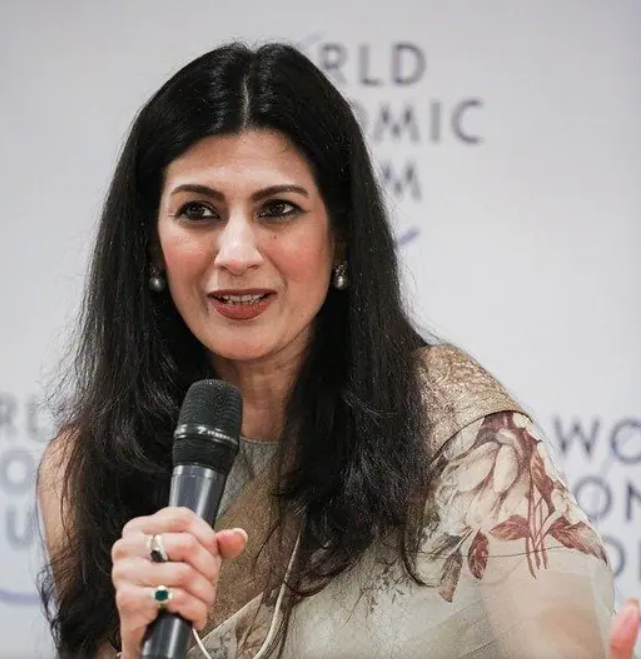Picture: Dipali Goenka (left) with her daughter Radhika and husband, Balkrishan Goenka, at Wimbledon in 2018.
One of only 3.7% female CEOs and managing directors of NSE-listed companies in India (2019), Dipali is also the lone woman on the eight-member council of the Welspun Group.
Dipali Goenka believes that one should “never let a crisis go waste”. The CEO and joint managing director of Welspun India Limited (WIL), India’s largest exporter of home-textile products, says that the Covid pandemic brought the greatest challenge the world faced in decades and WIL faced the impact too.
But, she adds, “Crises are the best opportunity to innovate and reinvent. Even with the coronavirus pandemic hitting businesses globally, at Welspun we have re-purposed our people, products, and processes to align with the changed ecosystem.”
To meet the immediate medical crisis, WIL – a Rs 5,400-crore company by annual revenues – provided health and wellness support and round-the-clock medical camps to all the communities around their operations, and even donated linen to Indian Army isolation wards.
“We conducted awareness drives, distributed masks and also collaborated with the state government and municipal authorities to provide masks and PPE kits,” says Dipali. In order to protect their 20,000-strong workforce, WIL introduced a five-layered security framework and an integrated app.
Focusing on employees and communities during a crisis is not just the right thing to do, it also translates into good business.
Welspun was launched in 1985 as a small textile mill in Palghar, Maharashtra, and was in its infancy when 18-year-old Dipali married Balkrishan and moved to Mumbai from Jaipur in 1987. In 2002, when their daughters were 10 and seven years old, Dipali joined Welspun.
“I had no prior work experience. All I had was innate passion, zest for learning and strong determination,” says Dipali, who was inspired by her mother, a consummate multitasker.
From then onward, Dipali had to prove herself at every turn. “BK was clear that I had to earn my spurs and create my own space. Nothing was handed on a platter,” says Dipali, who went on to complete the owner/president management programme at Harvard University.
“As a businesswoman, there are immense opportunities, and if you have the right skills and vision, success will follow. Having said that, I have also witnessed many challenges in my journey,” she shares.
She goes on: “The first challenge a woman faces is support from her family and friends. Women are multitaskers, but the men of the family need to start taking up more responsibilities in the daily affairs of the household. The extended family needs to understand and provide support. Women deserve respect as an equal contributor and we need to build this into our culture now.”

Dipali made her presence felt soon enough. “The primary buyer of home textiles is a woman. It appalled me that the industry was male-dominated,” she says. Until 2002, Welspun was primarily an exporter. Dipali championed its foray into the domestic retail market with the brand Spaces.
“It was a major transition for me,” she says. In 2004, Welspun City was inaugurated on a 2500-acre campus in the historic town of Anjar, in Kutch, Gujarat, and is Asia’s largest home-textile factory.
The success with domestic retail and later involvement with the exports business eventually made way for Dipali to become CEO of Welspun’s global business in 2010 and its joint MD in 2014.
“It caused a flutter in the male-dominated textile and manufacturing industry. The challenge was further amplified because as a woman leader you face unconscious biases,” says Dipali, who was ranked 16th on Forbes’ 2016 list of Asia’s 50 most powerful businesswomen and the fourth most powerful in India.
Under her watch, WIL has not only become a global leader in home-textile retailing in over 50 countries, but is also strategic partner to all top global retailers such as Macy’s, Marks & Spencer, and Marriott among several others, with farm-to-shelf capabilities and solutions from assortment to analytics.
With over 30 patents, Welspun has the highest market share in the US, and holds a dominant position in India and the UK. Its luxury label Christy England is the official towel licensee to the Wimbledon championships.
And yet, despite these achievements, Dipali Goenka still doesn’t have a Wikipedia entry in her name. The missing page is symbolic of the missing women in India’s corporate leadership space, a fact no one is more acutely aware of than Dipali. One of only 3.7% of CEOs and managing directors of NSE-listed companies in India (2019), she is often the only woman invited to major business leadership conclaves and is the lone woman on the eight-member council of the Welspun Group.
“One big challenge as a woman leader is to garner the trust and confidence of the teams you employ and work with. In traditionally male-dominated industries, women have to work harder and smarter to prove themselves,” she says.
Aware of her own position of privilege, Dipali is keen to pay it forward. In a country where the female labour force participation rate has fallen from 30% in 1990 to 20% in 2019, the group has 25% women employees and plans to increase this count.
“I personally believe that if you want the nation to progress then you need to empower women,” says Dipali, adding that the textile industry is the second largest employer in the country, contributing 3% to India’s GDP. “To become a USD 5 trillion economy, India needs to engage and employ its women demographic,” she asserts.
Last month, the group announced its ‘Women of Welspun’ initiative to provide an environment of growth and opportunities for its women employees, institutionalising progressive policies that actively help women to reach desired positions.
“Women should be provided the right mentoring, right environment of respect and skilling platforms to grow and transform into future leaders,” says Dipali. She also championed the company’s Super Sports Women programme where they sponsor promising women athletes across sports, such as Manasi Joshi, who is the current World Champion para-badminton player.
Besides women empowerment, Dipali is dedicated to WIL’s ESG (environmental, social and governance) focus, and has taken great strides in ensuring sustainability in production and retail. The company runs various community initiatives in education, environment and health, and has zero dependence on freshwater for manufacturing.
A fitness freak with a disciplined routine, Dipali believes one of the key lessons of the pandemic has been to collectively adapt to the changing ecosystem and showcase agility in business operations. “Leaders who create agile and resilient innovation-DNAs in their organisations will be positioned to meet the new needs of the post-Covid world,” she states.
Thanks to Welspun’s vertically integrated facilities and ecosystem, she says, “We were able to showcase agility and build new capabilities faster than ever before.” After all, Dipali Goenka is not one to let a crisis go waste.
Article Credit: moneycontrol
